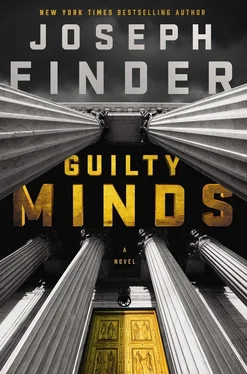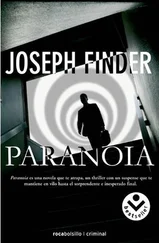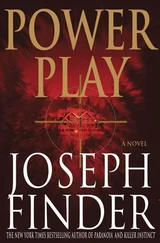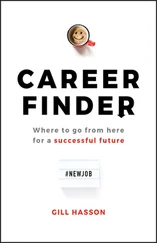I thought for a moment, remembering his uniform. “He was Washington Metro Police.”
“I doubt that. We have our own Supreme Court police. You see the tan patch on his left shoulder?”
He had no tan patch on his shoulder. “Thanks,” I said, spun around, and began striding down the hall.
Whether he was a real cop or not, the guy with the blond brush cut who’d so politely guided me to my locker — even providing the quarter — was obviously the one who’d emptied it. He’d picked out my locker in advance, which meant he had a copy of the key. He didn’t need to take one of the spares. He’d just waited for me to leave and then removed my laptop and iPhone. Had I been on alert, and had I known what to look for, I’d have noticed that he was wearing the uniform of a DC city cop. It had been a simple if brazen move, and the only reason it worked was that I hadn’t been operating with my usual wariness.
The question was, who was he and how did he know I’d be here?
This I couldn’t yet figure out.
I stopped mid-stride. I had a strong feeling that I was being watched. That the guy was somewhere nearby, within eyesight.
It was more than a feeling, of course. It was the result of “situational awareness,” which is the military’s fancy term for knowing what’s going on around you. In combat, your life can depend on whether you notice anomalies: the scuff of a boot, the glint of a weapon. I sensed a stillness at my eleven o’clock and turned. There, at the head of the staircase at the other end of the great hall, was a familiar blond crewcut. A man in a policeman’s uniform.
I walked casually in that direction, as if I hadn’t seen anything, but the man began going down the stairs, so I accelerated my pace until I was almost running. He must have realized he’d been spotted. By the time I reached the steep marble stairs, he was nowhere in sight. These were stairs meant for dignified procession, not hot pursuit. They were also not stairs you’d want to take a header down.
The problem was that I didn’t know the building’s layout at all. I’d had no reason to acquaint myself with the exits, not when I was just having a discreet private meeting with a Supreme Court justice. I hadn’t expected trouble because I figured no one knew I’d be here.
But obviously someone knew.
At the ground floor, I stopped, oriented myself. To my left was the visitors’ entrance. It wasn’t an exit, just an entrance. Maybe someone in a policeman’s uniform could slip out that way. The long, broad corridor was sparsely decorated with display cases. Down at the other end I saw a cafeteria and a gift shop. There seemed to be only two exits for the general public. One was upstairs, outside the courtroom, through the huge bronze doors. You couldn’t enter that way, but you could leave. The other exit was on this level, straight ahead of me. It appeared to lead to the plaza behind the court building, on Second Street. There was no security here. People were strolling out casually.
I had to make a decision. Try to force my way out the entrance, race for the exit onto Second Street, or stay inside the building and look for him here. It was possible he hadn’t left.
I went out the Second Street exit, looking in all directions, but it was no use. He wasn’t there.
That was all right. I didn’t have time to look anymore. I had far more urgent business to get to.
I’d forgotten what life was like without a cell phone. I had phone calls to make but no way to make them. I had to walk two blocks to find a pay phone that worked. It was covered with an ad for Red Bull. The holes in the mouthpiece were clogged with some mysterious brown substance that probably wasn’t Red Bull. When I remembered I had no quarters, I got change at a deli on East Capitol Street. I returned to my Red Bull pay phone, fished out Gideon Parnell’s business card from the breast pocket of my suit jacket, and called his mobile number.
He answered right away. “This is Gideon Parnell,” he said in his basso profundo.
“It’s Nick Heller.”
“You’ve spoken to my friend.”
“I’ll take the case.”
“Excellent. You have everything you need?”
I told him I thought I did and that I’d call back immediately if I didn’t. I understood that we were on a tight deadline — we had barely twenty-six hours before Slander Sheet’s deadline.
Next I wanted to call Dorothy, but her cell number was programmed into my iPhone, and I couldn’t remember it. Not so long ago I took pride in my ability to memorize numbers, but that seemed to be decaying, an evolutionary casualty of technology. Instead, I called my office and asked to be transferred.
“I called you a couple of times,” Dorothy said when she answered. “You must have been in your meeting with the justice.”
“What’s up?”
“I had that brainstorm I was talking about. How to hack into Lily Schuyler.com.”
“Tell me.”
“I used an old tried-and-true hacker trick — SQL injection. I found the customer log-in area on the website and started running script against the username and password fields. Trying to cause a buffer overflow.”
“Right,” I said, though I had no idea what she was saying.
“So I created a query in code, thirty characters long, and put that query into the username field. It dumped me into the back end of the website — the index.”
“I thought you were uncomfortable doing hacker stuff like that.”
“I am. But time is really short, and I was desperate. Also, it’s Gideon Parnell. I’d do anything for that guy. You know he marched with Martin Luther King?”
“Yep. I appreciate it.”
“I’ll e-mail you when I have something useful.”
“Oh, that reminds me. I don’t have a phone or a laptop anymore.”
“Anymore?”
“I’m temporarily back in the Dark Ages, and I don’t like it as much as I thought I would.”
I explained.
“Well, they’re both password-protected, the phone and the MacBook Air,” she said, “so you’re not at risk of losing information. More interesting...” I heard her tapping away at her keyboard. She seemed to be talking to herself.
Dorothy had set up both my phone and my laptop and given them to me plug-and-play. I’m no computer savant, but in my business you can no longer be ignorant about technology, unfortunately. At the very least you need to hire people who are good at it and let them do their thing. She insisted that Macs are extremely secure devices, and that the iPhone is the most secure phone you can get. I do what she recommends.
“Hold on one second,” she said. There we are. You have Find My iPhone turned on, very nice, and... oh, crap.”
“Now what?”
“They just turned it off.”
“How do you know this?”
“I see you had it at the Supreme Court building, but then it goes dark. That tells me they turned the phone off as soon as they stole it, and probably the laptop, too, to defeat the tracker. Someone knows what they’re doing. That’s too bad.”
“I’m going to need my phone and computer replaced.”
“Stop in at an Apple Store. There’s a couple in the district. Or else I can bring them to you.”
“How’s that?”
“You’re going to be in DC for at least a couple of days. My brother’s in the hospital in Prince George’s and I want to pay him a visit.”
“I’m sorry to hear about your brother.” I wasn’t aware that she had a brother. She was extremely private when it came to her personal business. “Ask Jillian to book us a couple of hotel rooms in DC,” I said. “It’s being billed to Shays Abbott, so make it a high-end place, something nice. Would you mind taking a piece of luggage for me?”
Читать дальше












